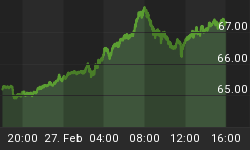Below is an extract from a commentary posted at www.speculative-investor.com on30th September 2004.
At TSI we rarely talk about what central banks are doing with their gold. This is because historical data and our own observations tell us that when the financial-market and economic trends are positive for gold the gold price will trend higher regardless how much gold the central banks sell or threaten to sell. We therefore try to stay focused on 'the signal' (trends in currencies, interest rates, asset prices) and ignore 'the noise' (central bank jawboning about gold, the Washington Agreement, reports of central bank gold sales/purchases, etc.).
This is not to say that governments and their central banks don't attempt to influence the gold price, because they most certainly do. However, it is clear from what happened during the 1970s and what has happened over the past few years that the inter-market relationships and other factors that SHOULD drive the gold price WILL drive the gold price regardless of the amount of direct intervention in the gold market by governments and/or their agents. The reason this is so is that confidence in the official currency will start to diminish and the investment demand for gold bullion will consequently start to rise once the effects of the central bank's inflation policies become evident outside the realm of financial assets. And once the process of inflation recognition is set in motion any attempts to suppress the gold price via central bank gold sales will only make matters worse (for the central banks) by further reducing confidence in the currency and boosting the investment demand for gold.
It is also worth noting that the total amount of gold bullion held in central bank coffers is miniscule compared to the total amount of fiat currency in the world and for this reason alone the idea that central banks can somehow control the gold price by drip-feeding their gold onto the market, either via sales or loans, is absurd. In a gold bull market the psychological effect of central bank gold sales is also not significant beyond the very short-term and in fact might, for the reason mentioned in the above paragraph, be the opposite of what many people first think.
What governments and central banks have learned, perhaps as a result of what happened during the 1970s, is how to influence the gold market INDIRECTLY. Actually, central banks don't care what the gold price is; what they care about are inflation expectations. The gold price, in turn, is just a reflection of the prevailing level of inflation expectations, meaning that if central bankers and politicians do a good job of managing expectations then the gold price will take care of itself.
So, how are inflation expectations 'managed'?
The below chart provides one example. The red line on the chart indicates the year-over-year change in the CPI and also highlights the great 'progress' made by the US Government over the past 20 years in the field of expectations management.
To further explain, compare the performance of the 'red line' during 1971-1983 with its performance since 1992. Now, if this were the only information you had to go on you would probably come to the conclusion that 1992-2004 was a period of great price stability in both absolute and relative terms; yet during this period we have seen:
a) The money supply growth rate rise from around zero during the first half of the 1990s to near the peak levels of the 1970s by 2001
b) One of the greatest stock market manias of all time followed by one of the greatest stock market collapses of all time
c) Many commodity prices go from multi-decade lows during 1998-2001 to multi-decade highs by 2004
d) Spectacular gains in the prices of housing, insurance, education, healthcare and energy
e) A 50% rise followed by a 30% fall in the Dollar Index
And through it all we have seen the CPI oscillate mildly at a low level.

Making sure the CPI remains low and non-volatile is just one aspect of the expectations management that occurs on a daily basis. Other aspects are more subtle and involve the planting of ideas, such as the deflation smokescreen that has prevented many 'experts' from believing the evidence of their own eyes.
If you really want to understand how central banks and governments manipulate markets then don't waste any time thinking about gold sales/loans, or the so-called Plunge Protection Team, or what the Exchange Stabilisation Fund (ESF) may or may not be doing with the relatively small amount of money it has at its disposal. Instead, think about how central banks are able to inflate like crazy while much of the world agonises over the threat of deflation.















